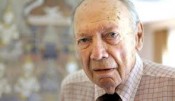By: Daniel Nardini
 On January 27th, the great journalist and historian Stanley Karnow passed away. He was 87 years old. There are hundreds of thousands of book titles on the Vietnam War in the English language, but in my view Karnow’s book on the Vietnam War is one of the best. First published in 1983, Stanley Karnow’s book Vietnam: A History, is one of the most complete and balanced books on the Vietnam War. This book was used as a required text for one of my university classes on the Vietnam War. The book compliments the TV history series Vietnam: A Television History, which Karnow narrated. Born on February 4, 1925, in Brooklyn, New York, Stanley Karnow seemed an unlikely correspondent for covering the Vietnam War, or indeed Vietnam at all. Having studied European history and literature at Harvard University, and at the University of Paris at Sorbonne, Karnow seemed more likely to be a correspondent in Europe. For almost the entire decade of the 1950’s, he was stationed in Paris where he worked for Time magazine. He traveled and reported widely—in the Middle East, in Africa, and in the Far East.
On January 27th, the great journalist and historian Stanley Karnow passed away. He was 87 years old. There are hundreds of thousands of book titles on the Vietnam War in the English language, but in my view Karnow’s book on the Vietnam War is one of the best. First published in 1983, Stanley Karnow’s book Vietnam: A History, is one of the most complete and balanced books on the Vietnam War. This book was used as a required text for one of my university classes on the Vietnam War. The book compliments the TV history series Vietnam: A Television History, which Karnow narrated. Born on February 4, 1925, in Brooklyn, New York, Stanley Karnow seemed an unlikely correspondent for covering the Vietnam War, or indeed Vietnam at all. Having studied European history and literature at Harvard University, and at the University of Paris at Sorbonne, Karnow seemed more likely to be a correspondent in Europe. For almost the entire decade of the 1950’s, he was stationed in Paris where he worked for Time magazine. He traveled and reported widely—in the Middle East, in Africa, and in the Far East.
When Karnow was assigned to Vietnam in 1959, it was an assignment that would change his life. He was one of the very first American correspondents in that country at the time, and he reported the first American death from the Vietnam War. From that point until 1974, Karnow covered the Vietnam War in its entirety. He wrote for such magazines and newspapers as Time, life, The Saturday Evening Post, The Washington Post, and reported for the TV news show NBC News. Karnow would see how the war unfolded for America as few journalists of the time did, and he tried to keep a balanced viewpoint of the war. He wrote about the trials and tribulations of the ordinary American soldiers in the field as well as their South Vietnamese allies and on what the Vietcong (Vietnamese Communist guerrillas) and North Vietnamese Army were doing. Although much more information would come to light on America’s involvement in the war in the 1990’s and later 2000’s (and likewise more information on what the Vietcong and North Vietnamese actually did as well), Karnow did his best to report the information on what happened in the best and most thorough manner possible.
Karnow did not praise one side or the other, and tried to provide the scenes behind the war as well as the truth of what happened (such as the American massacre at My Lai and the Vietnamese Communist massacre at Hue). In fact, Karnow makes it clear that the Vietnam War did not really end until 1989. Even though the United States pulled almost all of its military out of Vietnam in 1973, and the Vietnamese Communist forces eventually defeated and captured South Vietnam in 1975, the war really did not end. In 1978, Vietnamese forces invaded Cambodia and occupied that country for over a decade. When the Vietnamese withdrew from Cambodia, only then did war in Southeast Asia and for Vietnam come to an end. Essentially, Vietnam had been at war from 1941 to 1989—one of the longest modern wars on record. And Stanley Karnow covered it. Very few people ever get the chance to cover a subject of such importance in American history as this, and Stanley Karnow has made a great contribution to our understanding of one of America’s longest and most divisive wars. Thank you Stanley Karnow!
 America’s Favorite Travel Show is Back February 12, 2026
America’s Favorite Travel Show is Back February 12, 2026 Gov. Pritzker Celebrates Route 66 Centennial Kickoff February 12, 2026
Gov. Pritzker Celebrates Route 66 Centennial Kickoff February 12, 2026 Bill Payment Assistance Programs Available for Nicor Gas Customers February 12, 2026
Bill Payment Assistance Programs Available for Nicor Gas Customers February 12, 2026






In Praise of Stanley Karnow
By: Daniel Nardini
When Karnow was assigned to Vietnam in 1959, it was an assignment that would change his life. He was one of the very first American correspondents in that country at the time, and he reported the first American death from the Vietnam War. From that point until 1974, Karnow covered the Vietnam War in its entirety. He wrote for such magazines and newspapers as Time, life, The Saturday Evening Post, The Washington Post, and reported for the TV news show NBC News. Karnow would see how the war unfolded for America as few journalists of the time did, and he tried to keep a balanced viewpoint of the war. He wrote about the trials and tribulations of the ordinary American soldiers in the field as well as their South Vietnamese allies and on what the Vietcong (Vietnamese Communist guerrillas) and North Vietnamese Army were doing. Although much more information would come to light on America’s involvement in the war in the 1990’s and later 2000’s (and likewise more information on what the Vietcong and North Vietnamese actually did as well), Karnow did his best to report the information on what happened in the best and most thorough manner possible.
Karnow did not praise one side or the other, and tried to provide the scenes behind the war as well as the truth of what happened (such as the American massacre at My Lai and the Vietnamese Communist massacre at Hue). In fact, Karnow makes it clear that the Vietnam War did not really end until 1989. Even though the United States pulled almost all of its military out of Vietnam in 1973, and the Vietnamese Communist forces eventually defeated and captured South Vietnam in 1975, the war really did not end. In 1978, Vietnamese forces invaded Cambodia and occupied that country for over a decade. When the Vietnamese withdrew from Cambodia, only then did war in Southeast Asia and for Vietnam come to an end. Essentially, Vietnam had been at war from 1941 to 1989—one of the longest modern wars on record. And Stanley Karnow covered it. Very few people ever get the chance to cover a subject of such importance in American history as this, and Stanley Karnow has made a great contribution to our understanding of one of America’s longest and most divisive wars. Thank you Stanley Karnow!